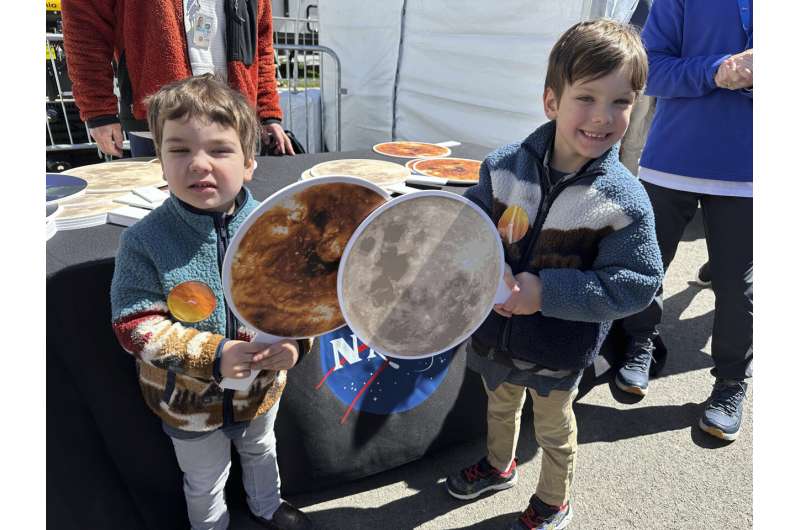North America won't see another coast-to-coast total solar eclipse for 21 years, prompting the weekend's worry and mad rush.
Monday's extravaganza stretches from Mexico's Pacific beaches to Canada's rugged Atlantic shores, with 15 U.S. states in between.
"I have arrived in the path of totality!" Ian Kluft announced Sunday afternoon after pulling into Mesquite from Portland, Oregon, a 2,000-mile (3,200-kilometer) drive.
A total eclipse happens when the moon lines up perfectly between Earth and the sun, blotting out the sunlight. That means a little over four minutes of daytime darkness east of Dallas in Mesquite, where locals like Jorge Martinez have the day off. The land surveyor plans to "witness history" from home with his wife and their 3-year-old daughter, Nati.
"Hopefully, she'll remember. She's excited, too," he said following breakfast at Dos Panchas Mexican Restaurant.
Inside the jammed restaurant, manager Adrian Martinez figured on staying open Monday.
"Wish it was going to be sunny like today," he said. "But cloudiness? Hopefully, it still looks pretty good."
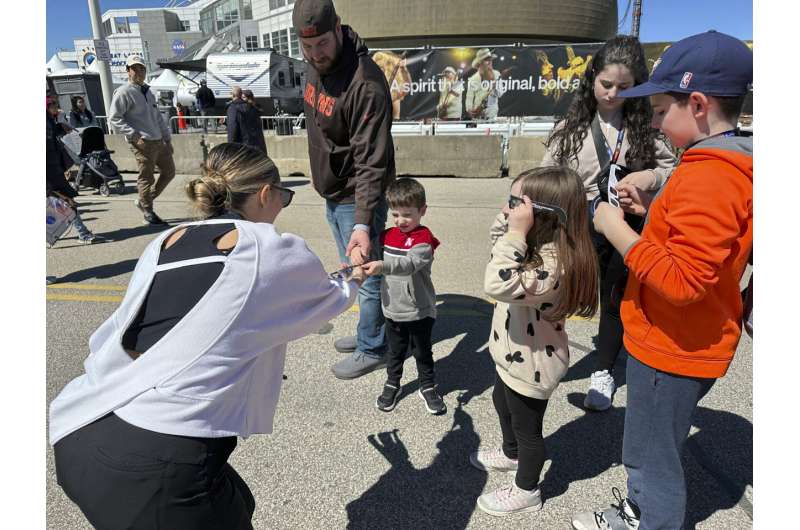
Near Ennis, Texas, to the south, the Range Vintage Trailer Resort was also packed, selling out of spots more than a year ago.
"I booked it instantly, then I told my wife, 'We're going to Texas,'" Gotham, England's Chris Lomas said from the trailer resort Sunday. Even if clouds obscure the covered-up sun, "it will still go dark. It's just about sharing the experience with other people," he added.
In Cleveland, the eclipse persuaded women's Final Four fans Matt and Sheila Powell to stick around an extra day after Sunday's game. But they were debating whether to begin their drive home to Missouri Valley, Iowa, early Monday in search of clearer skies along the eclipse's path. "We're trying to be flexible," Powell said.
Even the eclipse professionals were up in the air.
Eclipse mapmaker Michael Zeiler had a perfect record ahead of Monday, seeing 11 out of 11 total solar eclipses after successfully relocating three of those times at the last minute for better weather.
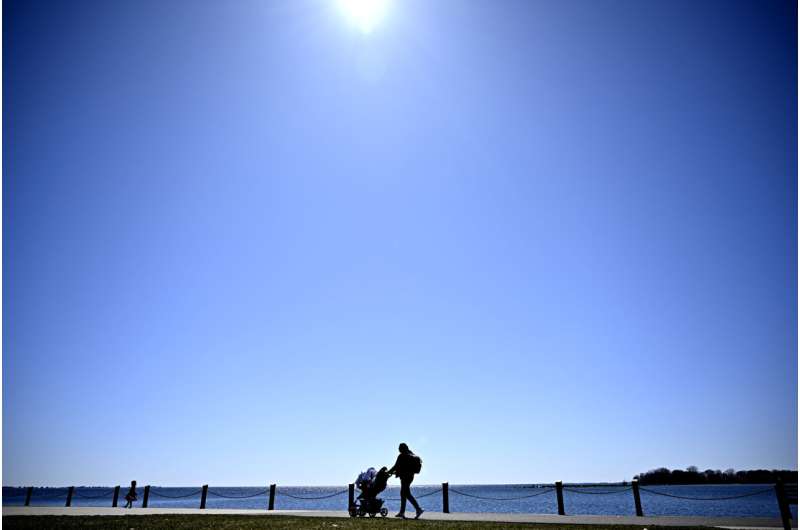
"We are the complete opposite of tornado chasers, always seeking clear skies," Zeiler said in an email over the weekend. This time, though, he was staying put in Fredericksburg, Texas, with his family, 10 of them altogether, and holding onto "a considerable ray of hope."
Farther north, in Buffalo, New York, Jeff Sherman flew in from Somerville, Massachusetts, to catch his second total solar eclipse. After seeing the U.S. coast-to-coast eclipse in 2017, "now I have to see any one that's nearby, he said.
Kluft also enjoyed clear skies for the 2017 eclipse, in Oregon, and rolled into Mesquite wearing the T-shirt from that big event. As for Monday's cloudy forecast across Texas, "at least I'll be around people who are like-minded."
Dicey weather was also predicted almost all the way to Lake Erie, despite Sunday's gorgeous weather. The only places promised clear skies along Monday's narrow 115-mile-wide (185-kilometer-wide) corridor of totality were New England and Canada.
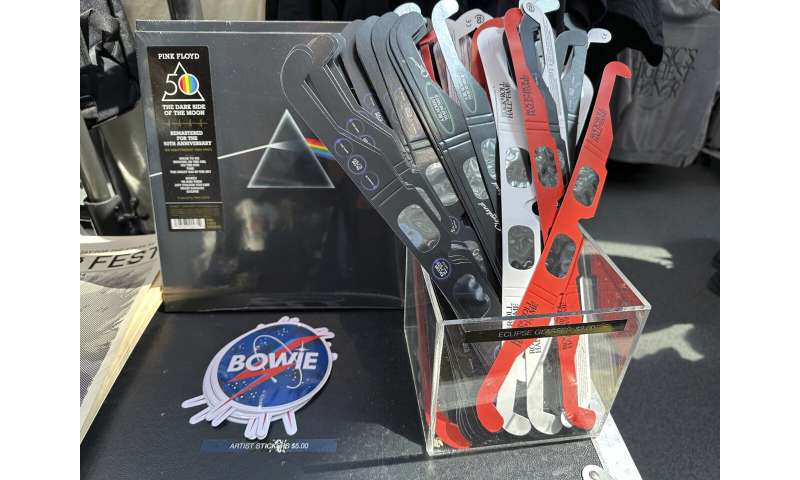
Eclipse glasses are for sale along with Pink Floyd's "Dark Side of the Moon," album at the Rock & Roll Hall of Fame in Cleveland, Sunday, April 7, 2024. Credit: AP Photo/Stephanie Nano 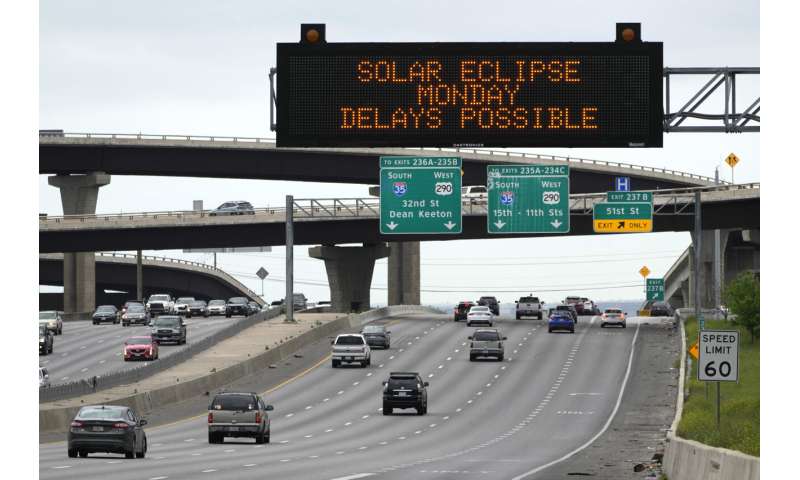
Motorists traveling toward Austin, Texas are reminded of Monday's eclipse and the possibility of traffic delays Saturday, April 6, 2024, in Austin. Credit: AP Photo/Charles Rex Arbogast
Like everywhere else, the weather was the hot topic at the Buffalo Naval and Military Park on Sunday. By mid-morning, volunteer Tom Villa already had greeted tourists from several states, as well as Canada and Brazil.
"They hope it's like this tomorrow, of course, but you know, the weather is the weather," he said.
© 2024 The Associated Press. All rights reserved. This material may not be published, broadcast, rewritten or redistributed without permission.



